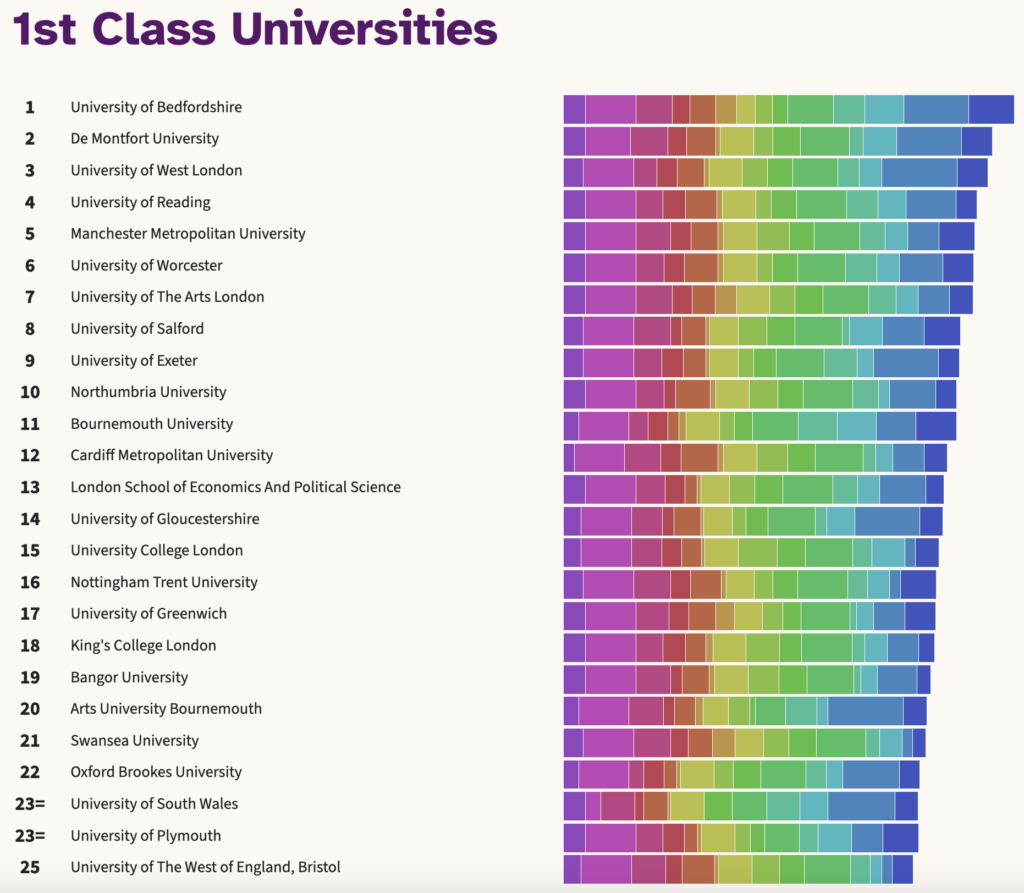More UK Universities Ending Big Oil Links, But Food & Flying Policies Still Lacking
4 Mins Read
The number of UK universities barring fossil fuel companies from graduate fairs has increased by 30%, but only 15% have meat-free food outlets on campus.
More and more British universities are ending recruitment links with fossil fuel companies, as part of a wider effort to limit investment from Big Oil, a new analysis has found.
In its annual sustainability and ethics survey of higher education in the UK, student campaign group People & Planet has found that 30% more universities have banned fossil fuel companies from recruitment fairs this year.
But while the vast majority of the sector had committed to divesting from fossil fuel companies, many still need to follow through on that pledge.
“Only 55% of UK universities have exclusions for fossil fuel extractor companies in their ethical investment policies, despite 78% having made public commitments to go fossil-free,” said Laura Clayson, climate justice campaigns manager for People & Planet. “We look forward to the sector aligning their policies with their proclamations in recognition of these demands for justice,” she added.
Post-92 universities shine, but Russell Group institutes falter

The 2024/25 People & Planet University League ranked 149 universities on 14 criteria linked to climate and social justice, with the institutions receiving grades via the same marking system their students do, from 1st, 2:1, 2:2, 3rd and Fail.
The University of Bedfordshire was ranked as the most sustainable higher education institute in the UK, after finishing in the top three for the last three years. It has been found to take bold steps to divest endowment funds from the fossil fuel industry and end recruitment pipelines with oil, gas and mining companies.
It also retrofitted and decarbonised its campus and invested in green energy over the last decade, translating into high scores for carbon reduction and energy sources.
This was among the seven post-1992 universities (former polytechnic institutions that were given university status in 1992) that made up the top 10 of the ranking, which People & Planet recognised as “early adopters of actions like ending recruitment links with fossil fuel companies and divesting from the border industry”.
Meanwhile, just four of the 24 prestigious Russell Group universities received a 1st class award this year, down from six the previous year. The University of Oxford kept its 2:1 ranking but slipped 27 places, while the University of Cambridge has dropped 38 places to a 3rd.
“88% of students think their place of study should actively incorporate and promote sustainable development, so universities need to meet this demand if they want to attract this generation of young people. In this way, investments in sustainability are crucial for the long-term health of universities,” said Jack Ruane, manager of the University League.
UK universities need to step up plant-based food offering

The universities were found to be lacking in several progress markers, including reducing emissions from food and flying. Only 13% of institutions have a plan to reduce aviation that prohibits mainland UK flights, for example, while only 15% of universities have a fully vegan or vegetarian outlet on campus.
King’s College and the University of Reading were the joint winners in the sustainable food criteria – the former has pledged to make all its food 60% plant-based and 70% vegetarian, and the latter (which was first on the overall ranking last year) has a plant-forward strategy focused on innovations like blended meat.
But 29 institutes did not score at all on the food sustainability aspect, receiving a Fail grade. This is despite over 650 academics and campaigners writing an open letter to British universities to switch to 100% vegan catering.
Meanwhile, the Universities of Stirling, Birmingham, Queen Mary, London Metropolitan, Kent, University College London and Cambridge have already voted to introduce fully plant-based menus at their eateries.
Overall, the University College of Osteopathy was ranked the least sustainable university in the UK, followed closely by Ravensbourne University London.
“As the climate crisis escalates, more and more universities are realising that climate justice can only be achieved by cutting ties with the fossil fuel industry. We’re delighted to see universities who’ve taken this vital step leading the way in this year’s University League,” said Josie Mizen, co-director of climate justice at People & Planet.
“There’s still much more work to do: we need more universities to commit to ending their relationships with oil, gas, and mining companies – but with a growing student movement standing up against these corporations infiltrating their campuses, we know it can be done.”



